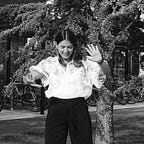Harnessing Mindfulness to Heal & Transform Racial Injustice
Professor Rhonda Magee is a teacher of mindfulness-based stress reduction interventions for lawyers, law students, and for minimizing social-identity-based bias at the University of San Francisco. Her forthcoming book The Inner Work of Racial Justice: Healing Ourselves and Transforming Our Communities Through Mindfulness, served as the perfect excuse to connect with this brilliant woman, so please read on for an invaluable conversation.
Professor Magee is not precisely new to the subjects of mindfulness and justice. In fact, this book is the product of years of innovative studies. “I came to law with a background in sociology, and I was very interested in the social function of law, and critiques of law that would take seriously the obvious and non-obvious ways that the law is impacting all of us,” she began.
Justice was a subject Professor Magee began exploring thoroughly as an academic, but quickly realized needed a broader approach. “I wanted to have that whole-body experience out of the traditional academic headspace, engaging with all of this in a way that might actually feel like justice and healing, so I started relying on yoga and my own mindfulness practices…I thought ‘I need to bring this embodied approach more to the fore, it cannot just be intellectual, that in it of itself can do real harm and get us…
